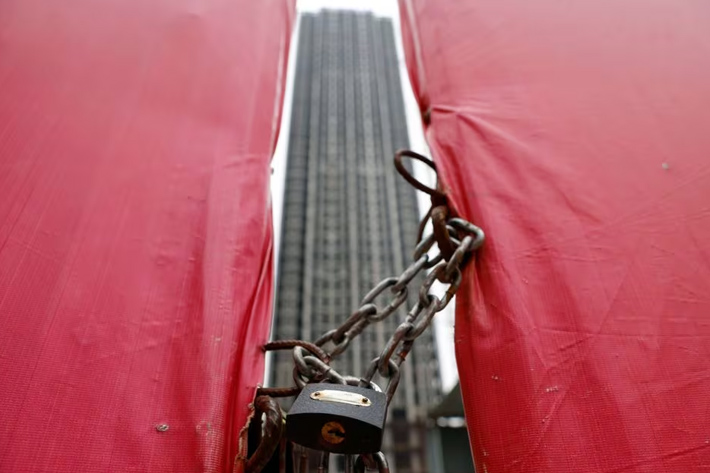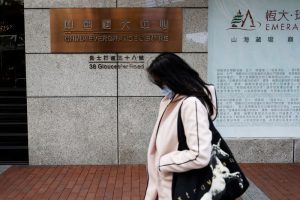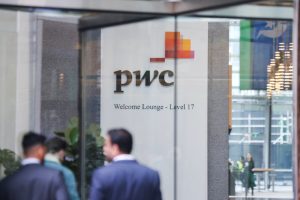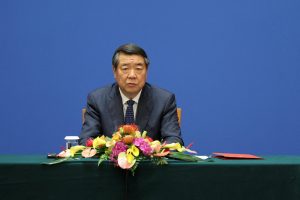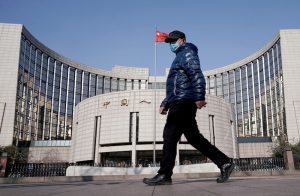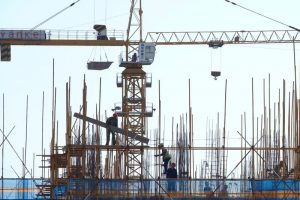Monday’s liquidation order for the world’s most indebted developer — China Evergrande — came as no surprise for most analysts.
With liabilities roughly the size of South Africa’s GDP, and zero progress on debt-restructuring — despite going into default more than two years ago — the liquidation order from a Hong Kong court meant to say “enough is enough.”
But that, after all, may not be the case.
Also on AF: Evergrande’s Fall Weighs on Hang Seng, Tech Boost Lifts Nikkei
Any liquidation of Evergrande will hinge on Chinese authorities recognising the ruling of a Hong Kong court, legal practitioners say.
“The PRC [People’s Republic of China] courts can refuse to recognise or assist Hong Kong liquidators in a number of ways under the cross border protocol,” said Jonathan Leitch, a Hogan Lovells partner in Hong Kong.
“This includes if mainland creditors may be unfairly treated or if recognition would violate basic principles of PRC law or if it would offend public order or good morals.”
China created a pilot scheme in 2021 in which courts in Shanghai, Xiamen and Shenzhen, can recognise Hong Kong-ordered insolvency proceedings.
However, as Evergrande is based in Guangzhou and many of its $240 billion of assets are spread across China, the liquidator will need to go to court in every city where Evergrande’s subsidiaries are based to try to take control.
Hong Kong courts have issued many liquidation orders on Chinese companies in the past and the cross-border procedure has been a challenge for many.
Derek Lai, global insolvency leader at auditing giant Deloitte, noted there were incidents where local governments treated offshore creditors unfairly. But the process went more smoothly when provincial governments stepped in to help, he said.
But in an interview with Chinese financial news firm 21jingji, Evergrande CEO Shawn Siu declared on Monday the liquidation ruling will only affect the group’s Hong Kong-listed unit. It will not have any impact on the group’s domestic and overseas units as they were “independent legal entities”, he added.
What’s at stake in for Beijing?
How local governments approach the liquidation order will depend entirely on how the Xi Jinping-led ‘socialist’ government assesses the challenges before it.
The most pressing issue before Beijing would likely be the potential impact on social stability from angry buyers who have paid for uncompleted and undelivered homes.
When Evergrande’s mountain of liabilities came to fore in 2021, it triggered widespread protests across China from people who had sunk their life’s worth of savings in unfinished homes.
In 2022, scores of Chinese homebuyers went on to declare they would stop paying mortgages on unfinished housing projects, triggering a sharp sell-off in real estate and banking stocks.
The Financial Times noted in its financial column Lex on Tuesday that around 1.5 million homebuyers had already paid Evergrande for pre-sold unfinished homes. Those properties were worth $90 billion originally, it said.
Managing the spill-out from a potential liquidation will be especially important for Beijing at a time when the world’s second-largest economy is already dealing with $13 trillion worth of provincial debt and skyrocketing youth unemployment.
It will also complicate Beijing’s efforts to manage the crisis in the property sector which has traditionally accounted for around a quarter of China’s economy.
Billions in debt have left multiple Chinese developers teetering on the edge of collapse and home-buying has continued to slump despite small measures from the government.
The real-estate crisis has also spilled over into the financial sector, taking down one of China’s biggest shadow banks.
With the threat of Evergrande’s liquidation looming, home-buyers could potentially further withdraw from real-estate investments and jeopardise Beijing’s efforts to offload millions of homes.
As of 2021, the number of vacant homes in China was 65 million — equivalent to the total number of households in France and the United Kingdom combined.
Is liquidation the only option?
Offshore creditors expect Evergrande’s liquidator, Alvarez & Marsal (A&M), to first propose a new offshore debt restructuring plan, and move to liquidate the company only if that could not be agreed, two sources told Reuters.
“Typically it is better for a liquidator to restructure the company than to liquidate, if that can be done successfully,” said Derek Lai, Deloitte global insolvency leader. “Creditors could usually get higher recovery this way.”
Evergrande had worked on a number of restructuring proposals which fell apart after the Chinese government ruled it was unable to issue new debt as its flagship onshore unit and chairman were under investigation for unspecified ‘crimes’.
View this post on Instagram
Justice Chan, who issued Monday’s liquidation order, said a liquidator taking over Evergrande’s management could help to clear that regulatory hurdle, paving the way for a new restructuring plan.
Given the sheer size of Evergrande and the potential impact on social stability, the restructuring talks are, however, expected to involve close communications with authorities in Beijing and Guangzhou, where Evergrande is based.
They are also likely to involve regulators including China Securities Regulatory Commission and National Development and Reform Commission.
After its appointment as liquidator on Monday, A&M said it would immediately head to Evergrande’s headquarters.
“We will meet with the company officers to obtain an understanding of the company’s affairs and determine next steps which serve the best interests of the creditors and other stakeholders,” an A&M spokesperson said.
How likely is Beijing to agree to restructuring or liquidation?
If restructuring talks with creditors fail, and mainland courts do recognise the Hong Kong judgment, offshore creditors will be able to seize unpledged onshore Chinese assets.
That process could take a number of years to complete, lawyers say.
But analysts believe that Beijing will likely give preference to interests of onshore creditors, even as it looks to improve its outlook for international investors.
The bulk of Evergrande’s onshore assets are land and property developments that have been pledged as collateral to onshore creditors, including banks and business partners. That creates a conflict between them and offshore creditors.
Making matters worse, Evergrande’s onshore creditors are already fighting amongst each other to take control of the developer’s assets.
In 2021, Guangdong province — home to Evergrande’s headquarters — announced it will takeover the ailing property giant. That caused other provinces, including the Jiangsu and Zhejiang provinces on the east coast and Hainan island in the south to rush to seize the company’s local assets before Guangdong beat them to it.
“As most of Evergrande’s assets are in mainland China, there are uncertainties about how the creditors can seize the assets and the repayment rank of offshore bondholders, and situation could be even worse for shareholders,” Gary Ng, senior economist at Natixis said.
“Investors will be concerned about whether there will be a snowball effect on other developers as the queue to liquidation is long.”
- Reuters, with additional inputs from Vishakha Saxena
Also read:
Mortgage Delinquencies in China Soared by 43% in 2023
Evergrande Unit Launches $280m Legal Case Against Parent
Evergrande Chief’s Two Luxury Mansions ‘Seized by Creditor’
Beijing Seen Taking Over China Evergrande’s Debt Revamp
Evergrande Chief Suspected Of Transferring Assets Offshore: WSJ
China Evergrande Chairman ‘Suspected of Crimes’, Company Says
Hui Ka Yan and The Rise and Fall of China Evergrande
China’s Property Sector Will Remain Weak For Years: Goldman




